Celebrate literature: fascinating people and writers who were born, or died, this coming week. Buy or download their books, or books about them. Read, because, as Ralph Waldo Emerson said: "In the highest civilization, the book is still the highest delight. He who has once known its satisfactions is provided with a resource against calamity."
Born this week:
Rene Bazin, Writer.Author of "novels of great charm and delicacy"
Yevgenia Ginzburg, Writer.Upon sentencing to 10 years, and loss of property: "To live! Without property, but what was that to me? Let them confiscate it -- they were brigands anyway, confiscating was their business. They wouldn't get much good out of mine, a few books and clothes -- why, we didn't even have a radio. My husband was a loyal Communist of the old stamp, not the kind who had to have a Buick or a Mercedes... Ten years! ...Do you [the judges], with your codfish faces, really think you can go on robbing and murdering for another ten years, that there aren't people in the Party who will stop you sooner or later?"
John Cowper Powys, Writer.Author of Wolf Solent, "the only book in the English languiage to rival Tolstoy."
"Man is the animal who weeps and laughs — and writes. If the first Prometheus brought fire from heaven in a fennel-stalk, the last will take it back — in a book."
Jean Baptiste Racine, Writer."Today, let us make haste to enjoy life. Who knows if we will be tomorrow?"
Heinrich Boll, Writer."One ought to go too far, in order to know how far one can go
."
Giuseppe Tomasi di Lampedusa, Writer."When a peasant gives me his bit of cheese he's making me a bigger present than the Prince of Làscari when he invites me to dinner. That's obvious. The difficulty is that the cheese is nauseating. So all that remains is the heart's gratitude which can't be seen and the nose wrinkled in disgust which can be seen only too well."
Julien Benda, Writer.In The Betrayal of the Intellectuals, Benda argued that French and German intellectuals in the 19th and 20th century had often lost the ability to reason dispassionately about political and military matters, instead becoming apologists for crass nationalism, warmongering and racism.
Henry Miller, Writer."This is not a book. This is libel, slander, defamation of character. This is not a book, in the ordinary sense of the word. No, this is a prolonged insult, a gob of spit in the face of Art, a kick in the pants to God, Man, Destiny, Time, Love, Beauty ... what you will"
Alejo Carpentier, Writer.Travel, Music and Writing... my dream.
Jesus ChristMakes the list for having inspired plenty of works of literature ;)
Died this week:
Yury Tynianow, Writer.Author of historical novels and biographies.
F. Scott Firzgerald, Writer."All good writing is swimming under water and holding your breath."
James Hilton, Writer.Hilton found literary success at an early age. His first novel, Catherine Herself, was published in 1920, when he was 20. Several of his books were international bestsellers and inspired successful film adaptations, notably Lost Horizon (1933), which won a Hawthornden Prize; Goodbye, Mr. Chips (1934); and Random Harvest (1941). Lost Horizon, which sold briskly in the 1930s as one of the first Pocket Books (it in fact bore the serial number "1"), is sometimes referred to as the book that began the paperback revolution.
John Steinbeck, Writer."The discipline of the written word punishes both stupidity and dishonesty."
Carl Sagan, Writer."I would love to believe that when I die I will live again, that some thinking, feeling, remembering part of me will continue. But much as I want to believe that, and despite the ancient and worldwide cultural traditions that assert an afterlife, I know of nothing to suggest that it is more than wishful thinking."
Giovanni Boccaccio, Writer."I have always been given to understand…that whereas a single cock is quite sufficient for ten hens, ten men are hard put to satisfy one woman."
Kurt Tucholsky, Writer."For four years, there were whole square miles of land where murder was obligatory, while it was strictly forbidden half an hour away. Did I say: murder? Of course murder. Soldiers are murderers."
Lion Feuchtwanger, Writer.Feuchtwanger served in the German Army during World War I, an experience that contributed to a leftist tilt in his writings. After studying a variety of subjects, he became a theater critic and founded the culture magazine, "Der Spiegel", in 1908. He soon became a figure in the literary world, and was sought out by the young Bertolt Brecht, with whom he collaborated on drafts of Brecht's early work, The Life of Edward II of England, in 1923-24. According to Feuchtwanger's widow, Marta, Feuchtwanger was a possible source for the titles of two other Brecht works, including Drums in the Night (first called Spartakus by Brecht).
George Eliot, Writer."My own experience and development deepen everyday my conviction that our moral progress may be measured by the degree in which we sympathize with individual suffering and individual joy."
Nikolay Ostrowski, Writer."Man's dearest possession is life. It is given to him but once, and he must live it so as to feel no torturing regrets for wasted years, never know the burning shame of a mean and petty past; so live that, dying he might say: all my life, all my strength were given to the finest cause in all the world- the fight for the Liberation of Mankind."
Benito Lynch, Writer.An eccentric, Lynch's quirky short stories, (he wrote more than a hundred) in a neo-gauchoesque manner that sometimes evokes magic realism, have been often filmed and dramatized. He also strikes a genuinely and authentically popular vein.
Samuel Beckett, Writer."I think the next little bit of excitement is flying. I hope I am not too old to take it up seriously, nor too stupid about machines to qualify as a commercial pilot. I do not feel like spending the rest of my life writing books that no one will read. It is not as though I wanted to write them."
Anatoly Rybakov, Writer.His most popular novel Children of the Arbat was written and distributed via samizdat in the 1960s, but was not published until 1987 despite having been officially announced for publication in 1966 and 1978 (in both cases publication was canceled at the very last moment by the Soviet government). The eventual publication of the novel and its sequels - 1935 and Other Years («Тридцать пятый и другие годы», 1989), Fear («Страх», 1990) and Dust & Ashes («Прах и пепел», 1994) - were considered a landmark of the nascent glasnost, as the first in the trilogy was one of the earliest publications of previously forbidden anti-Stalin literature.
William Makepeace Thackeray, Writer."Dare, and the world always yields: or, if it beat you sometimes, dare again, and it will succumb."
Arturo Barea, Writer.His The Forge (La Forja) tells the story of his childhood and adolescence growing up in Madrid between 1905 and 1914. ( It was reviewed favourably by George Orwell in Horizon, " a fragment of autobiography, and we may hope that others will follow it..if the Fascist powers have done no other good, they have at least enriched the English-speaking world by exiling all their best writers. "
Louis Aragon, Writer.As a novelist he encompasses the whole ethos of the Twentieth century: surrealist novel, socialist realism, realism, nouveau roman. Indeed he was one of the founding personalities of the novel of his time.
Harold Pinter, Playwright."The U.S. is really beyond reason now. It is beyond our imagining to know what they are going to do next and what they are prepared to do. There is only one comparison: Nazi Germany... Nazi Germany wanted total domination of Europe and they nearly did it. The U.S. wants total domination of the world and is about to consolidate that...
Blair sees himself as a representative of moral rectitude. He is actually a mass murderer. But we forget that — we are as much victims of delusions as Americans are."
Vladimir Korolenko, Writer, Activist,"Violence feeds on submission like fire feeds on dry grass."
Paul Charles Bourget, Writer."At certain moments, words are nothing; it is the tone in which they are uttered."
Karel Capek, Writer."Much melancholy has devolved upon mankind, and it is detestable to me that might will triumph in the end ... Art must not serve might."
Louis de Vilmerin, Writer."Francis Poulenc nearly literally sang her praises, considering her an equal to Paul Éluard and Max Jacob, found in her writing "a sort of sensitive impertinence, libertinage, and appetite which, carried on into song [is] what I tried to express in my extreme youth with Marie Laurencin in Les Biches."



 "There is fiction, and there is history. Certain critics of no discernment have considered that fiction is history which might have taken place, and history is fiction which has taken place. We are, indeed, forced to acknowledge that the novelist's art often compels belief, just as reality sometimes defies it. Alas! there exists an order of minds so sceptical that they deny the possibility of any fact as soon as it diverges from commonplace."
"There is fiction, and there is history. Certain critics of no discernment have considered that fiction is history which might have taken place, and history is fiction which has taken place. We are, indeed, forced to acknowledge that the novelist's art often compels belief, just as reality sometimes defies it. Alas! there exists an order of minds so sceptical that they deny the possibility of any fact as soon as it diverges from commonplace."  "No one can advise or help you — no one. There is only one thing you should do. Go into yourself. Find out the reason that commands you to write; see whether it has spread its roots into the very depths of your heart; confess to yourself whether you would have to die if you were forbidden to write."
"No one can advise or help you — no one. There is only one thing you should do. Go into yourself. Find out the reason that commands you to write; see whether it has spread its roots into the very depths of your heart; confess to yourself whether you would have to die if you were forbidden to write." "You may be thinking of me as a man who achieved his life's goals. Yet, I'd be delighted to swap places with you. ... Man never reaches what he set out to achieve. Behind the goal is a horizon, and behind it another, and another; the closer we get to it, the farther it becomes
"You may be thinking of me as a man who achieved his life's goals. Yet, I'd be delighted to swap places with you. ... Man never reaches what he set out to achieve. Behind the goal is a horizon, and behind it another, and another; the closer we get to it, the farther it becomes "You praise the machine. That machines are working for you. Well, well. They no longer work for you, but you're working for them. And they have a lot of needs! Machine is not a horse, which you can feed oats and let it out to pasture. Machine will tear your veins open. Look how fast it runs, how it plows, scoops the earth. You're drawn to it. Machines get away from you, and you pursue them. You either catch up or not catch up with them, and these machines have created the next, without your input. Self-born, iron from iron. These new ones are faster. And you have to rush furiously so as not to be left behind. You no longer have time for each other... soon you'll ride over each other on the road, in pursuit of living faster. You know, in earlier times people had worked too, they did not sit with folded hands, but they worked leisurely, not like that. Now everything is done on the run. You run to work, and to the table - there is no time for anything. Even children are born in a race. And these children barely had time to be born, they barely stand on their feet, and are already out of breath.
"You praise the machine. That machines are working for you. Well, well. They no longer work for you, but you're working for them. And they have a lot of needs! Machine is not a horse, which you can feed oats and let it out to pasture. Machine will tear your veins open. Look how fast it runs, how it plows, scoops the earth. You're drawn to it. Machines get away from you, and you pursue them. You either catch up or not catch up with them, and these machines have created the next, without your input. Self-born, iron from iron. These new ones are faster. And you have to rush furiously so as not to be left behind. You no longer have time for each other... soon you'll ride over each other on the road, in pursuit of living faster. You know, in earlier times people had worked too, they did not sit with folded hands, but they worked leisurely, not like that. Now everything is done on the run. You run to work, and to the table - there is no time for anything. Even children are born in a race. And these children barely had time to be born, they barely stand on their feet, and are already out of breath. 
 "Alba wondered where so many Fascists had come from overnight, because in the country's long democratic history they had not been particularly noticeable, except for a few who got carried away during World War II and thought it amusing to parade in black shirts with their arms raised in salute - to the laughter and hissing of bystanders - and had never won any important role in the life of the country. Nor did she understand the attitude of the armed forces, most of whom came from the middle and working class and had traditionally been closer to the left than to the far right. She did not understand the state of civil war, nor did she realize that war is the soldiers' work of art, the culmination of all their training, the gold medal of their profession. Soldiers are not made to shine in times of peace. The coup gave them a chance to put into practice what they had learned in their barracks: blind obedience, the use of arms, and other skills that soldiers can master once they silence the scruples of their hearts."
"Alba wondered where so many Fascists had come from overnight, because in the country's long democratic history they had not been particularly noticeable, except for a few who got carried away during World War II and thought it amusing to parade in black shirts with their arms raised in salute - to the laughter and hissing of bystanders - and had never won any important role in the life of the country. Nor did she understand the attitude of the armed forces, most of whom came from the middle and working class and had traditionally been closer to the left than to the far right. She did not understand the state of civil war, nor did she realize that war is the soldiers' work of art, the culmination of all their training, the gold medal of their profession. Soldiers are not made to shine in times of peace. The coup gave them a chance to put into practice what they had learned in their barracks: blind obedience, the use of arms, and other skills that soldiers can master once they silence the scruples of their hearts."
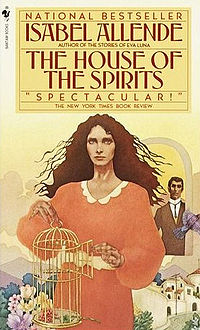


 Feeling foggy about the world around you? Read literature:
Feeling foggy about the world around you? Read literature: "For decades in art circles it was either a rumour or a joke, but now it is confirmed as a fact. The Central Intelligence Agency used American modern art - including the works of such artists as Jackson Pollock, Robert Motherwell, Willem de Kooning and Mark Rothko - as a weapon in the Cold War. In the manner of a Renaissance prince - except that it acted secretly - the CIA fostered and promoted American Abstract Expressionist painting around the world for more than 20 years.
"For decades in art circles it was either a rumour or a joke, but now it is confirmed as a fact. The Central Intelligence Agency used American modern art - including the works of such artists as Jackson Pollock, Robert Motherwell, Willem de Kooning and Mark Rothko - as a weapon in the Cold War. In the manner of a Renaissance prince - except that it acted secretly - the CIA fostered and promoted American Abstract Expressionist painting around the world for more than 20 years.  The Institute for Economics and Peace and Media Tenor have released "Measuring Peace in the Media":
The Institute for Economics and Peace and Media Tenor have released "Measuring Peace in the Media": "Well, I've worried some about, you know, why write books ... why are we teaching people to write books when presidents and senators do not read them, and generals do not read them. And it's been the university experience that taught me that there is a very good reason, that you catch people before they become generals... and presidents and so forth and you poison their minds with ... humanity, and however you want to poison their minds, it's presumably to encourage them to make a better world." Kurt Vonnegut
"Well, I've worried some about, you know, why write books ... why are we teaching people to write books when presidents and senators do not read them, and generals do not read them. And it's been the university experience that taught me that there is a very good reason, that you catch people before they become generals... and presidents and so forth and you poison their minds with ... humanity, and however you want to poison their minds, it's presumably to encourage them to make a better world." Kurt Vonnegut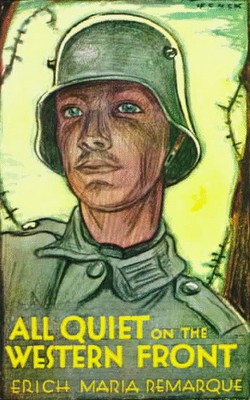 If there is a single book that one ought to read on this Veterans Day / Remembrance Day, then it ought to be the All Quiet on the Western Front, by
If there is a single book that one ought to read on this Veterans Day / Remembrance Day, then it ought to be the All Quiet on the Western Front, by  "Colonel-General Michael Goleniewski is widely credited as being one of the most important Western agents ever to have operated within the Soviet KGB and its satellite agencies. He was the vice chairman of Communist Poland's military intelligence when he escaped to the West in 1960, bringing thousands of Top Secret Soviet documents as well as information identifying hundreds of highly placed Soviet agents in western governments and intelligence agencies. Among the important communist agents Goleniewski exposed were Kim Philby, George Blake, Gordon Lonsdale, Morris and Lona Cohen, Henry Houghton, Ethel Gee, and Stig Wennerström. So strategic, timely, and reliable were his revelations that the House of Representatives of the 88th Congress passed House Resolution 5507 to honor Goleniewski's exceptional contributions to American security."
"Colonel-General Michael Goleniewski is widely credited as being one of the most important Western agents ever to have operated within the Soviet KGB and its satellite agencies. He was the vice chairman of Communist Poland's military intelligence when he escaped to the West in 1960, bringing thousands of Top Secret Soviet documents as well as information identifying hundreds of highly placed Soviet agents in western governments and intelligence agencies. Among the important communist agents Goleniewski exposed were Kim Philby, George Blake, Gordon Lonsdale, Morris and Lona Cohen, Henry Houghton, Ethel Gee, and Stig Wennerström. So strategic, timely, and reliable were his revelations that the House of Representatives of the 88th Congress passed House Resolution 5507 to honor Goleniewski's exceptional contributions to American security."

 Looking for thrills this Halloween? Look no further than the book, described by the LA Times as: "... a far more frightening work than any of the nightmare novels of George Orwell ... the thesis that propaganda, whether its ends are demonstrably good or bad, is not only destructive to democracy, it is perhaps the most serious threat to humanity operating in the modern world."
Looking for thrills this Halloween? Look no further than the book, described by the LA Times as: "... a far more frightening work than any of the nightmare novels of George Orwell ... the thesis that propaganda, whether its ends are demonstrably good or bad, is not only destructive to democracy, it is perhaps the most serious threat to humanity operating in the modern world."
 "The cracking of the “unbreakable”
"The cracking of the “unbreakable”  "Krystyna Skarbek was a Polish Special Operations Executive (SOE) agent. She became celebrated especially for her daring exploits in intelligence and sabotage missions to Nazi-occupied Poland and France.
"Krystyna Skarbek was a Polish Special Operations Executive (SOE) agent. She became celebrated especially for her daring exploits in intelligence and sabotage missions to Nazi-occupied Poland and France. "One of Britain's most-decorated female spies was initially dismissed as "scatterbrained" and "not very intelligent" by her superiors, documents released for the first time today reveal.
"One of Britain's most-decorated female spies was initially dismissed as "scatterbrained" and "not very intelligent" by her superiors, documents released for the first time today reveal.
 "The precious metals markets have tremendous potential for investors. But they are also wrapped up in great mystery -- deliberately so.
"The precious metals markets have tremendous potential for investors. But they are also wrapped up in great mystery -- deliberately so.


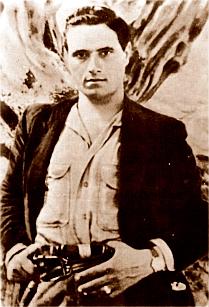 "Salvatore Giuliano (November 16, 1922 – July 5, 1950) was a Sicilian peasant. The subjugated social status of his class led him to become a bandit and separatist who has been mythologised during his life and after his death. He is commonly compared to the legend of Robin Hood in popular culture, due to stories pertaining to him helping the poor villagers in his area by taking from the rich.
"Salvatore Giuliano (November 16, 1922 – July 5, 1950) was a Sicilian peasant. The subjugated social status of his class led him to become a bandit and separatist who has been mythologised during his life and after his death. He is commonly compared to the legend of Robin Hood in popular culture, due to stories pertaining to him helping the poor villagers in his area by taking from the rich.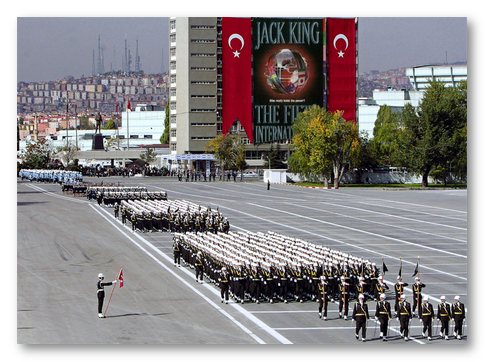


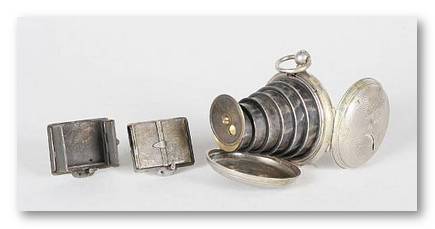

 "While armed confrontation constituted part of the strategy to liberate societies from the yoke of colonialism, literature in the form of poetry, prose and drama also played an important part in educating the oppressed populations of their plight and by so doing urge them to fight that oppression.
"While armed confrontation constituted part of the strategy to liberate societies from the yoke of colonialism, literature in the form of poetry, prose and drama also played an important part in educating the oppressed populations of their plight and by so doing urge them to fight that oppression. Invisible Ink in espionage:
Invisible Ink in espionage:
 "There they lay - badly wounded cases or men who could not walk any farther - wrapped in rags and bedded down on dirty straw or simply on the floorboards, keeping themselves warm by huddling together or by means of bonfires. There was no one there to attend to them, if there had been, it would not have helped them much, for the Army Staff had canceled the sixty-gramme bread ration for the wounded on the ground that those who cannot fight, shall not eat. The walking cases dragged themselves to a near-by pump to wait for the horse-drawn carts. Before the unsuspecting driver understood what was happening they would throw themselves with pocket-knives, pieces of metal or just their bare hands on to the trembling horse and cut it to pieces, carrying away with them the shreds of steaming flesh."
"There they lay - badly wounded cases or men who could not walk any farther - wrapped in rags and bedded down on dirty straw or simply on the floorboards, keeping themselves warm by huddling together or by means of bonfires. There was no one there to attend to them, if there had been, it would not have helped them much, for the Army Staff had canceled the sixty-gramme bread ration for the wounded on the ground that those who cannot fight, shall not eat. The walking cases dragged themselves to a near-by pump to wait for the horse-drawn carts. Before the unsuspecting driver understood what was happening they would throw themselves with pocket-knives, pieces of metal or just their bare hands on to the trembling horse and cut it to pieces, carrying away with them the shreds of steaming flesh."

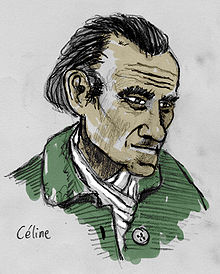 "Let's talk about work, the job of writing. It's the only thing that counts. And even that calls for a good deal of indiscretion. Too much publicity in the way people talk about these things. We're objects of publicity. It's revolting. It's high time people took a cure of modesty. In literature as in everything else we're befouled by publicity. It's disgraceful. I say: do your job and shut up, that's the only way. People will read it or they won't read it, that's their business. The only thing for the author to do is to make himself scarce."
"Let's talk about work, the job of writing. It's the only thing that counts. And even that calls for a good deal of indiscretion. Too much publicity in the way people talk about these things. We're objects of publicity. It's revolting. It's high time people took a cure of modesty. In literature as in everything else we're befouled by publicity. It's disgraceful. I say: do your job and shut up, that's the only way. People will read it or they won't read it, that's their business. The only thing for the author to do is to make himself scarce."
 "Have you ever, as a reader, felt misunderstood? Do non-readers around you ask why you read so much? Have you ever had to defend your choice of books because you prefer fiction to self-help? And have you ever found the words to make non-readers truly understand the impact books have had on your life?
"Have you ever, as a reader, felt misunderstood? Do non-readers around you ask why you read so much? Have you ever had to defend your choice of books because you prefer fiction to self-help? And have you ever found the words to make non-readers truly understand the impact books have had on your life?



 "The US book publishing industry consists of about 2,600 companies with combined annual revenue of about $25 billion. [COMPARISON: The Motion Picture Industry's annual revenue is approx $55 Billion] The industry is highly concentrated: the top 50 companies generate about 80 percent of revenue.
"The US book publishing industry consists of about 2,600 companies with combined annual revenue of about $25 billion. [COMPARISON: The Motion Picture Industry's annual revenue is approx $55 Billion] The industry is highly concentrated: the top 50 companies generate about 80 percent of revenue.